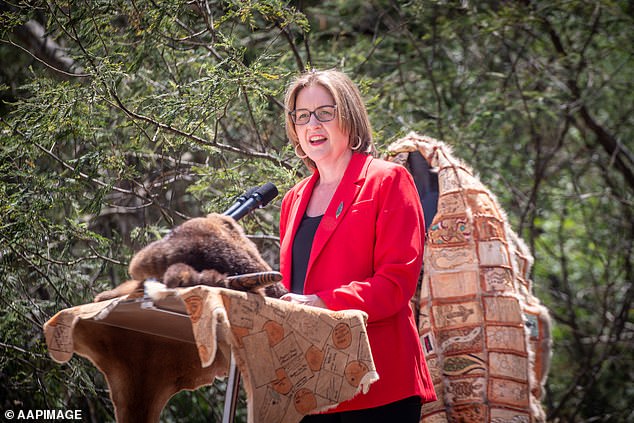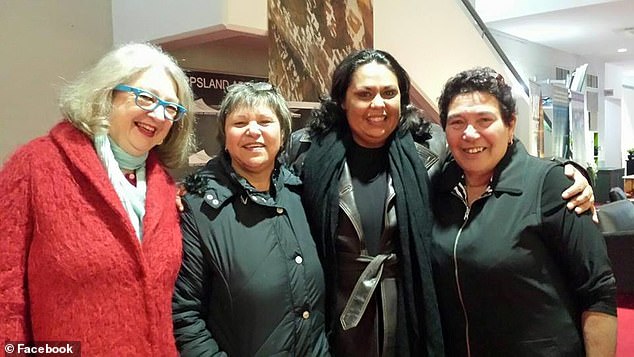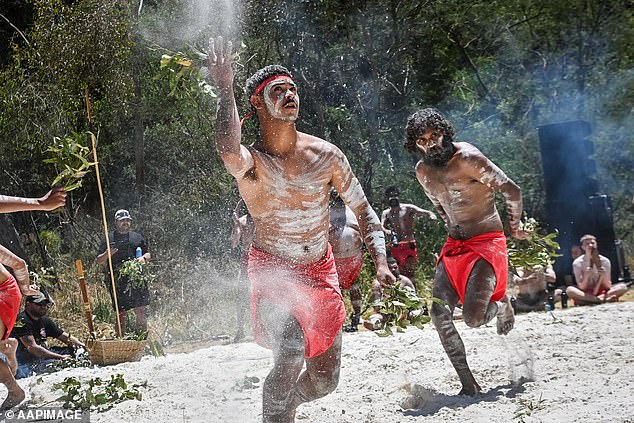Indigenous elders have condemned the Allan government’s proposed treaty body, arguing the state used their language in its name without proper consultation.
Victoria’s Labor government introduced a treaty bill to parliament last month which establishes the Gellung Warl, a representative body for Indigenous Australians.
Evolving from the First Peoples’ Assembly of Victoria, the body will have governance, oversight and decision-making powers and will be operational by July 1 next year.
In her second reading speech Premier Jacinta Allan said using First Nations languages is a ‘practical way we can show respect’.
But local Kurnai Elder Aunty Cheryl Drayton, from Gippsland in the state’s south-east, claims the Kurnai people were not properly consulted in the naming of the Gellung Warl.
‘Under our customary law, people just can’t come on to country, or do things relating to country without, at least, speaking to the elders and getting consent,’ she told the Herald Sun.
‘There was no consent given, but they are doing it anyway, and they are just being very disrespectful.’
Aunty Cheryl objected to the creation of the Gellung Warl and added Kurnai elders do not support the treaty.

Local elders claim they were not consulted on the use of their language in naming a representative body proposed by Premier Jacinta Allan’s (pictured) government

Kurnai Elder Aunty Cheryl Drayton (right) has called for the treaty bill to be abandoned
Fellow Kurnai Elder Pauline Mullet agreed, writing to the Premier the failure to consult local people on the use of their language is not only inappropriate but harmful.
‘To use our language to name a political body that the Kurnai people do not support is not only inappropriate, it is also harmful,’ she wrote.
‘It misrepresents our stance and risks turning our sacred words into symbols of a process we have not endorsed.’
The First Peoples’ Assembly of Victoria, which the government claims was responsible for naming the body, said it consulted with a range of stakeholders regarding the use of language names in the treaty.
Among them it named traditional owner groups, members, elders, knowledge holders and the Victorian Aboriginal Corporation for Languages.
On naming the Gellung Warl specifically, the Assembly said it obtained formal permissions from the relevant Aboriginal corporation.
Ms Mullet told the Daily Mail many Aboriginal corporations are not representative of local Indigenous communities and said the government had failed to get the Kurnai people’s ‘informed consent’.
Critics have compared the Gellung Warl to a Voice to Parliament, which Aunty Cheryl called on her community to vote against in September 2023.

Dancers perform in front of the Chairs of the First Peoples’ Assembly of Victoria
‘While there’s no meat on the bone of how this is going to work, I can’t see how any normal person with a brain could vote for it,’ she told The Age at the time.
‘It doesn’t tell them how people are going to get elected [on to the Voice].
‘The government has thrown a lot of money at this and it could have been spent developing communities’ aspirations.’
Debate over the treaty bill, which has not yet cleared parliament, is expected to take place over the coming weeks.
Once passed, it will pave the way for schoolchildren to be taught about the ‘enduring harm’ of colonisation since 1788, a formal apology and for more geographical locations to be given Indigenous names.
Victoria is the first state in the country to introduce legislation for an Aboriginal treaty.
Share or comment on this article:
Aboriginal Australians turns on Treaty in Victoria over glaring issue: ‘No consent given’
